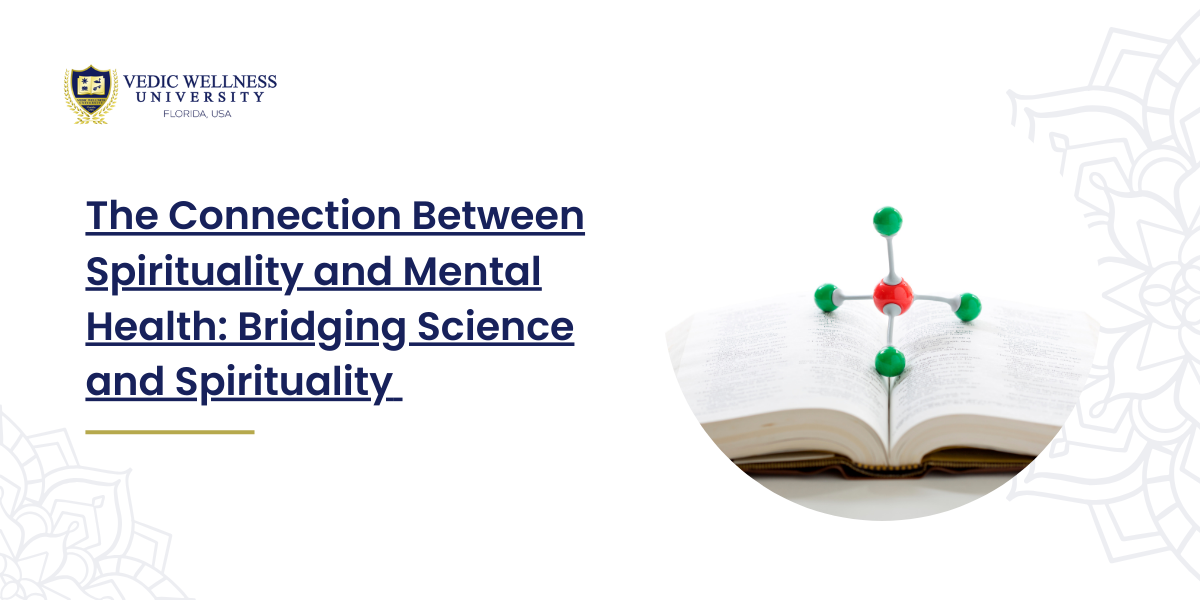मन एव मनुष्याणां कारणं बन्धमोक्षयोः।
(Manah Eva Manushyanam Karanam Bandha Mokshayoh)
“The mind alone is the cause of bondage and liberation for human beings.” – Amritabindu Upanishad 2
Introduction
The relationship between spirituality and mental health has intrigued scholars, philosophers, and scientists for centuries. As our understanding of mental health evolves, it becomes increasingly evident that a purely scientific approach may not be sufficient to address the complexities of human well-being. Integrating science and spirituality offers a more comprehensive view, acknowledging that mental health encompasses not only biological and psychological factors but also spiritual dimensions.
This blog explores the profound connection between spirituality and mental health, emphasizing the synergy between science and spirituality. Drawing from the principles of Ayurveda, Yoga, and Vedic philosophy, we will delve into how spiritual practices can enhance mental well-being and how Vedic Wellness University is committed to promoting these teachings on a global scale.
Ayurveda: The Science of Life and Its Relevance to Mental Health
Ayurveda, one of the world’s oldest holistic healing systems, provides a unique perspective on mental health by integrating mind, body, and spirit. Known as the “Science of Life,” Ayurveda emphasizes the balance of the three doshas—Vata (air and space), Pitta (fire and water), and Kapha (water and earth)—for optimal health. These doshas not only influence our physical health but also affect our mental and emotional states.
Basic Principles of Ayurveda Related to Mental Health
- The Three Doshas and the Mind: In Ayurveda, each dosha governs different aspects of the mind:
- Vata: Associated with creativity, flexibility, and movement. An imbalanced Vata can lead to anxiety, fear, and restlessness.
- Pitta: Governs intelligence, focus, and ambition. When Pitta is out of balance, it can manifest as anger, irritability, and impatience.
- Kapha: Represents stability, calmness, and emotional resilience. An excess of Kapha can result in lethargy, depression, and attachment.
- Sattva, Rajas, and Tamas: The Three Gunas of the Mind: Ayurveda categorizes mental states into three qualities or gunas:
- Sattva: Represents purity, harmony, and balance. It is associated with clarity, wisdom, and compassion.
- Rajas: Signifies activity, passion, and restlessness. It can lead to agitation, desire, and distraction when in excess.
- Tamas: Denotes inertia, darkness, and ignorance. Excessive Tamas can cause confusion, depression, and lethargy.
- Mind-Body-Spirit Connection: Ayurveda emphasizes that mental health is intrinsically linked to physical health and spiritual well-being. Practices like meditation, yoga, and pranayama are used to balance the doshas and enhance Sattva, leading to a state of mental clarity and emotional stability.
These principles form the basis for understanding how integrating science and spirituality can offer a more holistic approach to mental health.

The Interplay Between Spirituality and Mental Health
Spirituality, often defined as the search for meaning and purpose in life, involves connecting with something greater than oneself. This connection can take various forms, such as meditation, prayer, yoga, or engaging in acts of compassion and kindness. Numerous studies have shown that spirituality can have a positive impact on mental health by reducing stress, anxiety, and depression, and promoting a sense of peace and well-being.
How Science and Spirituality Complement Each Other in Mental Health
- Neurobiological Benefits of Spiritual Practices: Research in neuroscience has shown that spiritual practices like meditation, prayer, and chanting can positively affect the brain. These practices activate the prefrontal cortex, responsible for focus, decision-making, and emotional regulation, and reduce activity in the amygdala, which is associated with stress and fear responses. This highlights the intersection of science and spirituality in promoting mental health.
- Spirituality as a Coping Mechanism: Spirituality offers a sense of hope, meaning, and purpose, which are crucial for coping with life’s challenges. It fosters resilience by helping individuals view difficulties as opportunities for growth rather than obstacles. Spiritual communities also provide social support, which is a significant factor in mental health and recovery.
- Integrative Approaches to Healing: Integrative medicine combines conventional treatments with spiritual practices, such as meditation, yoga, and Ayurveda, to address both the mind and body. This approach acknowledges that science and spirituality are not mutually exclusive but complementary, providing a more holistic pathway to mental well-being.
By understanding how spirituality impacts mental health, we can appreciate the need for integrating scientific and spiritual approaches to achieve comprehensive healing.
Categories of Spiritual Practices and Their Impact on Mental Health
Spiritual practices are diverse and cater to different aspects of mental well-being. They can be broadly categorized based on their objectives and the specific benefits they offer for mental health.
1. Meditation and Mindfulness Practices:
- Definition and Benefits: Meditation involves focusing the mind and eliminating distractions to achieve a state of calm and clarity. Mindfulness is a form of meditation that emphasizes being present in the moment without judgment.
- Impact on Mental Health: Meditation and mindfulness practices have been shown to reduce anxiety, depression, and stress. They improve focus, emotional regulation, and overall mental clarity, contributing to greater Sattva (mental purity) as described in Ayurveda.
2. Yoga and Pranayama:
- Definition and Benefits: Yoga combines physical postures (asanas), breath control (pranayama), and meditation to promote physical and mental well-being. Pranayama, or controlled breathing, helps regulate the flow of energy (prana) in the body.
- Impact on Mental Health: Regular practice of yoga and pranayama can balance the doshas and gunas, reducing stress, improving mood, and enhancing emotional resilience. It is a practical example of how science and spirituality work together to promote mental health.
3. Chanting and Mantras:
- Definition and Benefits: Chanting involves repeating sacred sounds or phrases (mantras) to focus the mind and connect with higher consciousness. Mantras like “Om Namah Shivaya” or “Gayatri Mantra” are widely practiced for spiritual and mental benefits.
- Impact on Mental Health: Chanting has a calming effect on the mind, reduces mental chatter, and enhances emotional stability. It aligns the mind with positive vibrations, promoting peace and mental clarity.
4. Service and Compassion (Seva):
- Definition and Benefits: Seva, or selfless service, involves helping others without expecting anything in return. It is considered a spiritual practice that purifies the mind and heart.
- Impact on Mental Health: Engaging in acts of compassion and service fosters a sense of purpose, belonging, and interconnectedness. It reduces feelings of isolation and depression and enhances emotional fulfillment.
By incorporating these spiritual practices, individuals can achieve a harmonious balance between science and spirituality, leading to better mental health outcomes.
Vedic Wellness University: Promoting Science and Spirituality for Mental Well-being
Vedic Wellness University (VWU) is dedicated to promoting the integration of science and spirituality as a foundation for holistic mental health. The university offers a range of courses that delve into the principles of Ayurveda, Yoga, Spiritual Science, and Vedic philosophy, emphasizing the importance of mental, emotional, and spiritual well-being.

Courses Offered by Vedic Wellness University
- Diploma in Spiritual Psychology and Mental Wellness:
This course provides an introduction to the intersection of psychology, spirituality, and mental health. It covers the basic principles of Ayurveda, Yoga, and mindfulness practices that promote mental well-being.
- Graduate and Postgraduate Programs in Integrative Health Sciences:
These programs offer a deeper understanding of the relationship between science and spirituality and their application in mental health care. They include training in meditation, yoga therapy, Ayurvedic counseling, and spiritual healing.
- PhD in Vedic Sciences and Spiritual Health:
For advanced scholars, this program provides an opportunity to conduct original research on the impact of spiritual practices on mental health. It explores the integration of spiritual wisdom with modern psychological approaches.
- Associate Programs with Global Institutions:
VWU collaborates with educational institutions worldwide to offer specialized courses that promote the integration of science and spirituality, ensuring that these teachings reach a broader audience.
How to Enroll in Vedic Wellness University Courses
Prospective students can explore the various programs offered by VWU through the official website. The enrollment process is straightforward, with flexible learning options, expert faculty guidance, and access to comprehensive course materials.
Conclusion
The connection between spirituality and mental health is an area of growing interest and importance in today’s world. By bridging science and spirituality, we can address mental health in a more holistic and effective way, considering the mind, body, and spirit as a unified whole. Spiritual practices such as meditation, yoga, chanting, and selfless service provide valuable tools for achieving mental clarity, emotional stability, and overall well-being.
Vedic Wellness University is at the forefront of this movement, promoting an integrative approach to mental health that combines ancient wisdom with modern science. By offering a range of courses, VWU empowers individuals worldwide to explore the profound connection between spirituality and mental health and embark on a journey of healing and transformation.
**ॐ शान्तिः शान्त


